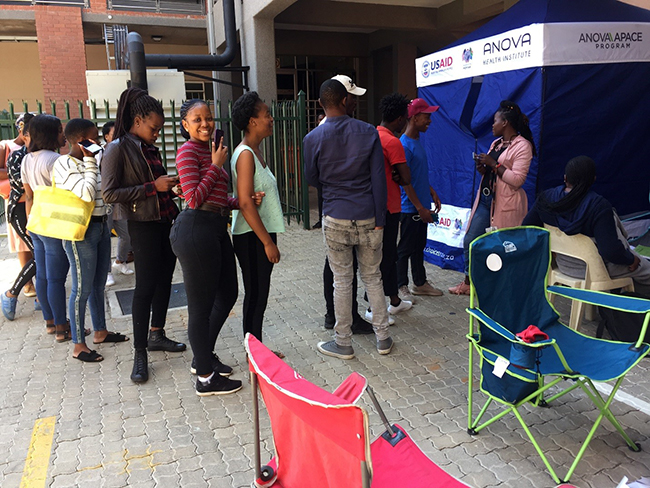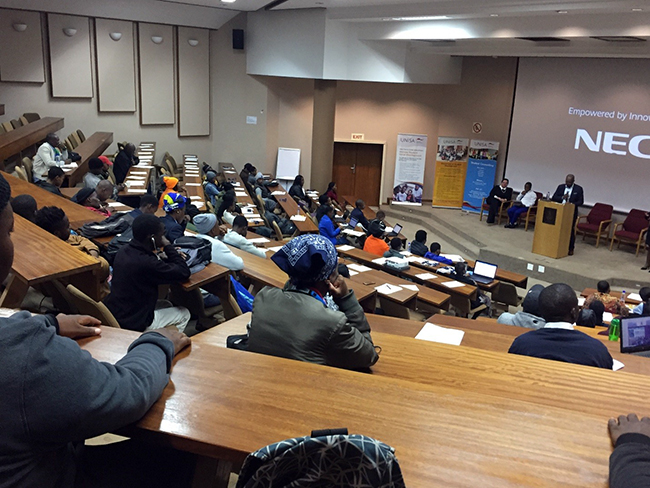News & Events
Student campaigns raise health and wellbeing awareness
The Department of Student Affairs, under the leadership of Dr Sibusiso Chalufu, Dean of Students and acting Executive Director: Student Affairs and Regional Services, recently hosted a series of student health and wellbeing awareness campaigns for Unisa students at the Science Campus and the Polokwane Service Centre.
Student vulnerability is on the increase due to financial instability and mounting environmental pressures. These include poverty, gender-based violence, HIV and AIDS, racism and other forms of social exclusion. Other challenges confronting our students are related to depression and suicide.
The purpose of the campaigns was to raise awareness and provide education about health and wellbeing to Unisa students within a student development context. Speaking at the campaigns, Tshegofatso Mogaladi, Deputy Director: Student Development, contextualised student health and wellness in a student development framework.
The campaigns adopted a holistic model to wellbeing, focusing on aspects of physical, emotional, social, financial, academic, environmental and spiritual wellness. During the campaigns various service providers showcased their service offerings to Unisa students and demonstrated wellness activities such as eating healthy and exercising, to name but a few. Students had access to HIV testing and screenings for, amongst others, blood pressure, weight and body mass index.

Students avail themselves of the health screening services on offer
Unisa’s National and Regional Student Representative Councils participated in the programmes, which were supported by high numbers of students. The campaigns extended over a period of two days. Day one focused on raising awareness of mental health and the importance of health screenings. Day two comprised of a workshop and counselling with a closed group of students dealing with issues of depression, suicide and addiction. The programmes were directed by Lizette le Roux, Manager: Student Social Development.
Dr Chalufu officially launched the first campaign in the Florida campus. In his speech, he highlighted the following aspects:
- The role of student affairs and support practitioners, including the provision of psycho-social support, holistic student development and dimensions of wellness.
- Whether, empirically, practitioners know the young people they work with, including their challenges and needs; and whether practitioners know the actual number of students struggling with issues of mental health and wellness, including the nature, type and extent of such issues.
- A 2017 global research study which pointed, inter alia, to the disconcerting issue of the ‘large mental health treatment gap’ that the researchers highlighted.
- Information pertaining to the Higher Education and Training HIV/AIDS Programme’s new focus.
- The importance of paying attention to what may be unique challenges of students with disabilities, matured students, and incarcerated students.
In conclusion, Dr Chalufu indicated that the workshop is a critical start, but a lot more needs to be done.

Students attending a presentation
The various presentations and other actions on the two campaigns were as follows:
- Dr Irene Mohasoa addressed issues of substance abuse and its impact on mental health.
- The keynote address of Dr Senathi Fisha, CEO and founder of the Fisha Group, covered issues of depression in students.
- Tintswalo Makhubele, General Secretary of the South African Congress of Non-Profit Organisations, motivated students with a talk on self-leadership and successes.
- Student Social Development, through its internship placement programme for fourth-year student social workers, provided an onsite intake opportunity for counselling.
- In Polokwane Mmemeru Lephondo, Head of Counselling: North Eastern Region, addressed students on identifying stress factors and devising coping strategies to deal with stress.
- Fiona Mahlori, a Unisa Student Health and Wellness Practitioner, addressed suicide prevention and support.
- At the conclusion of the programme, Tebogo Mangope thanked all the students, speakers and service providers who participated.
Student Affairs is mandated to address student health and wellness at Unisa, while Student Development is committed to building a more caring society. Said programme director Lizette le Roux after the event: ‘We need to establish collaborative partnerships with all the stakeholders and address mental health challenges amongst our students. We believe that if we do commit to working together towards addressing the health and well-being of students, this will positively contribute to student academic excellence.’
Some of the student feedback received:
‘Learning about the statistics of students suffering from mental health issues was shocking. I also learned about how to deal with mental health issues that are affecting students on a daily basis.’ (Unisa student, Florida campus).
‘I enjoyed the aerobics exercise, The event should take place at least three times a year.’ (Unisa student, Polokwane).
‘I found the physical exercises and HIV testing most useful. The event was effective as it met my expectations (Unisa student, Polokwane).
* Compiled by Lizette Le Roux, Manager: Student Social Development, and Fiona Mahlori, Student Health and Wellness Practitioner
Publish date: 2019-05-21 00:00:00.0

